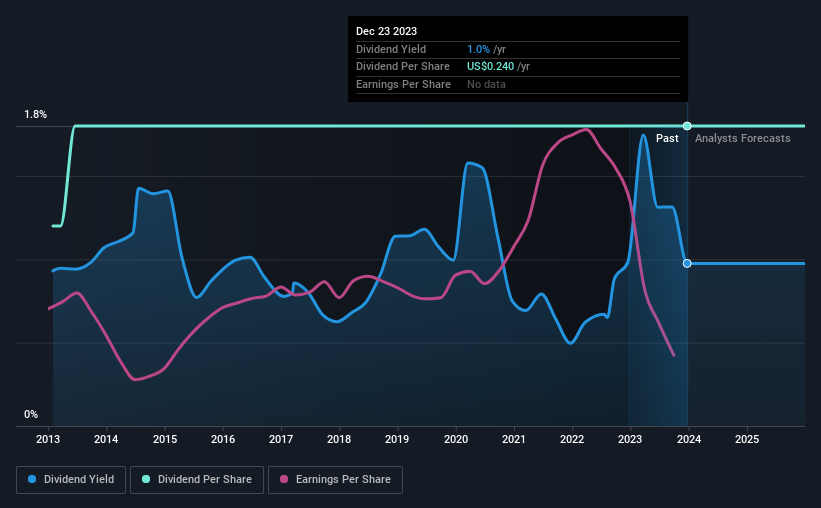Four Days Left Until First Internet Bancorp (NASDAQ:INBK) Trades Ex-Dividend
First Internet Bancorp (NASDAQ:INBK) is about to trade ex-dividend in the next 4 days. The ex-dividend date is usually set to be one business day before the record date which is the cut-off date on which you must be present on the company's books as a shareholder in order to receive the dividend. The ex-dividend date is important as the process of settlement involves two full business days. So if you miss that date, you would not show up on the company's books on the record date. Accordingly, First Internet Bancorp investors that purchase the stock on or after the 28th of December will not receive the dividend, which will be paid on the 16th of January.
The company's next dividend payment will be US$0.06 per share, and in the last 12 months, the company paid a total of US$0.24 per share. Looking at the last 12 months of distributions, First Internet Bancorp has a trailing yield of approximately 1.0% on its current stock price of $24.6. If you buy this business for its dividend, you should have an idea of whether First Internet Bancorp's dividend is reliable and sustainable. So we need to check whether the dividend payments are covered, and if earnings are growing.
See our latest analysis for First Internet Bancorp
Dividends are typically paid from company earnings. If a company pays more in dividends than it earned in profit, then the dividend could be unsustainable. First Internet Bancorp is paying out just 20% of its profit after tax, which is comfortably low and leaves plenty of breathing room in the case of adverse events.
When a company paid out less in dividends than it earned in profit, this generally suggests its dividend is affordable. The lower the % of its profit that it pays out, the greater the margin of safety for the dividend if the business enters a downturn.
Click here to see the company's payout ratio, plus analyst estimates of its future dividends.
Have Earnings And Dividends Been Growing?
Businesses with shrinking earnings are tricky from a dividend perspective. Investors love dividends, so if earnings fall and the dividend is reduced, expect a stock to be sold off heavily at the same time. With that in mind, we're discomforted by First Internet Bancorp's 10% per annum decline in earnings in the past five years. Ultimately, when earnings per share decline, the size of the pie from which dividends can be paid, shrinks.
Another key way to measure a company's dividend prospects is by measuring its historical rate of dividend growth. First Internet Bancorp has delivered 4.1% dividend growth per year on average over the past 10 years.
The Bottom Line
Should investors buy First Internet Bancorp for the upcoming dividend? Earnings per share have shrunk noticeably in recent years, although we like that the company has a low payout ratio. This could suggest a cut to the dividend may not be a major risk in the near future. We're unconvinced on the company's merits, and think there might be better opportunities out there.
With that being said, if dividends aren't your biggest concern with First Internet Bancorp, you should know about the other risks facing this business. Our analysis shows 1 warning sign for First Internet Bancorp and you should be aware of it before buying any shares.
Generally, we wouldn't recommend just buying the first dividend stock you see. Here's a curated list of interesting stocks that are strong dividend payers.
Have feedback on this article? Concerned about the content? Get in touch with us directly. Alternatively, email editorial-team (at) simplywallst.com.
This article by Simply Wall St is general in nature. We provide commentary based on historical data and analyst forecasts only using an unbiased methodology and our articles are not intended to be financial advice. It does not constitute a recommendation to buy or sell any stock, and does not take account of your objectives, or your financial situation. We aim to bring you long-term focused analysis driven by fundamental data. Note that our analysis may not factor in the latest price-sensitive company announcements or qualitative material. Simply Wall St has no position in any stocks mentioned.

